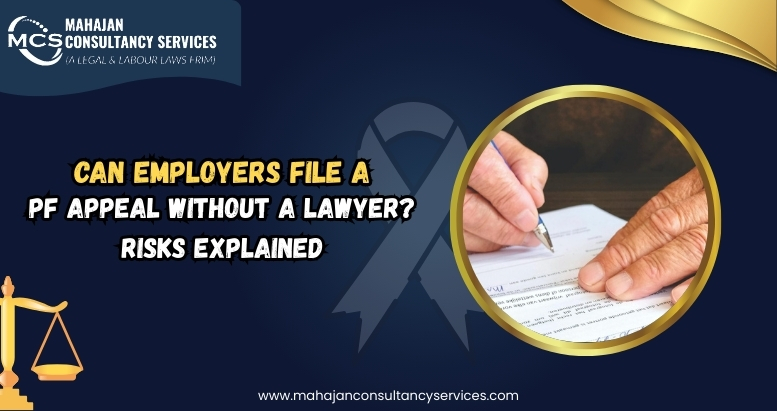The Employees’ Provident Fund (EPF) is an essential social security scheme in India, ensuring retirement savings for employees. Employers often interact with the EPFO to manage contributions, withdrawals, and appeals. In certain situations, employers may need to file a PF appeal to challenge EPFO decisions, correct discrepancies, or recover deductions.
A common question among Indian corporates is whether they can file a PF appeal without a lawyer. While it is technically possible, doing so carries significant risks, from procedural errors to legal non-compliance, which can result in rejection or prolonged delays. Mahajan Consultancy, with expertise in PF compliance, helps corporates navigate these challenges effectively.
Understanding PF Appeals
A PF appeal is an official request to the Employees’ Provident Fund Organization (EPFO) to reconsider a decision regarding PF contributions, account discrepancies, or claim rejections. Appeals may arise due to:
- Incorrect PF deductions or remittances
- Mismatched Universal Account Numbers (UAN)
- Non-reflection of contributions in the employee’s account
- Disputes over withdrawals or transfers
Filing an appeal requires careful adherence to EPFO procedures, submission of supporting documents, and legal understanding of PF laws under the Employees’ Provident Funds and Miscellaneous Provisions Act, 1952.
Can Employers File Without a Lawyer?
Legally, employers in India can file a PF appeal without a lawyer, as there is no mandatory requirement for legal representation at the EPFO or appellate tribunal level. Many small and medium enterprises attempt self-filing to save costs.
However, the appeal process is complex, involving strict timelines, procedural formalities, and proper documentation. Any mistake, even minor, can result in automatic rejection or lengthy delays.
Risks of Filing a PF Appeal Without a Lawyer
Filing a PF appeal without professional guidance carries several risks:
Risk 1: Procedural Errors
PF appeals must follow the prescribed procedure, including submitting Form 13, Form 5, or other relevant documents through the EPFO portal or regional office. Incorrect forms, missing signatures, or improper attachments can lead to rejection.
Risk 2: Incomplete or Incorrect Documentation
PF appeals require supporting documents like:
- UAN details
- PF account statements
- Employee contribution records
- Bank account proofs
Errors or missing documents often delay the appeal or result in outright rejection. A lawyer or compliance expert ensures that the submission is complete and accurate.
Risk 3: Non-Compliance with EPF Rules
Understanding EPF rules is critical. Employers may misinterpret rules regarding contribution limits, withdrawal eligibility, or deadlines. Filing an appeal without this knowledge increases the chance of legal non-compliance and dispute escalation.
Risk 4: Delays in Resolution
Incorrectly filed appeals often require multiple rounds of corrections, which significantly delays resolution. Employees may experience frustration, and corporates may face reputational or operational risks.
Risk 5: Legal Challenges from Employees
An incorrectly handled appeal can trigger legal disputes with employees, especially if it affects their PF balances or withdrawal rights. This can result in labor tribunal cases or penalties for the employer.
Risk 6: Financial Consequences
Mistakes in PF appeals can have direct financial implications, such as:
- Recovery of excess contributions
- Penalties for delayed remittance
- Interest charges for mismanaged accounts
Professional guidance minimizes these financial risks.
Benefits of Hiring a Lawyer or Compliance Expert
Employers who engage a lawyer or PF compliance consultant like Mahajan Consultancy gain several advantages:
- Accuracy: Ensures all forms and documents are correctly filled and attached
- Compliance: Verifies adherence to EPFO rules and Indian labor laws
- Efficiency: Streamlines filing and follows up with the EPFO to expedite resolution
- Risk Mitigation: Reduces the risk of appeal rejection, employee disputes, and financial penalties
- Legal Representation: Provides professional support if the appeal escalates to tribunals or courts
When Self-Filing May Be Viable
Self-filing a PF appeal can work in cases where:
- The issue is straightforward, such as minor UAN mismatches
- Complete documentation is already in order
- The employer has prior experience with EPFO procedures
Even in these cases, careful verification of details is essential to avoid errors.
Step-by-Step Process for PF Appeal Filing
Even without a lawyer, employers should follow these steps carefully:
- Identify the Issue: Clearly determine why the appeal is necessary (e.g., contribution mismatch, claim rejection).
- Collect Documentation: Gather UAN, PF account statements, employee contribution records, and supporting evidence.
- Choose the Correct Form: EPFO provides specific forms depending on the appeal type (e.g., Form 13 for transfer, Form 5 for employer issues).
- Submit to EPFO: File through the official EPFO portal or regional office. Ensure all attachments are correct.
- Track the Appeal: Maintain a record of submission and follow up regularly.
- Respond Promptly: If EPFO requests clarifications, provide them promptly to avoid delays.
- Escalate if Needed: If rejected, consider professional legal assistance for tribunal appeal.
Real-Life Indian Example
Consider a medium-sized Indian enterprise that attempted to self-file a PF appeal due to a minor employee contribution mismatch. Due to missing documentation and incomplete UAN details, the EPFO rejected the appeal twice. Only after engaging Mahajan Consultancy did the company correct the errors, resulting in successful resolution within weeks instead of months.
This example illustrates how even minor mistakes can create unnecessary complications without expert support.
Key Takeaways
Employers in India can file PF appeals without a lawyer, but the risks are substantial. Procedural errors, incomplete documentation, non-compliance, delays, employee disputes, and financial consequences can outweigh any cost savings.
Hiring a legal or compliance expert, such as Mahajan Consultancy, ensures:
- Accurate and complete submissions
- Full compliance with EPFO and Indian labor laws
- Reduced risk of rejection and delays
- Professional guidance in case of disputes or escalations
For corporates with multiple employees or complex PF issues, professional assistance is often the safer and more efficient choice.
Conclusion
While self-filing a PF appeal is legally permissible in India, it carries significant risks that can affect compliance, finances, and employee relations. Employers who attempt it without proper knowledge may face rejections, delays, and legal disputes. Engaging a lawyer or a PF compliance consultant like Mahajan Consultancy reduces these risks, ensuring smooth and legally compliant PF appeal processing.
Mahajan Consultancy provides end-to-end PF appeal services, from document preparation to liaison with EPFO and legal support, helping corporates save time, reduce errors, and maintain compliance.
FAQs
- Can employers file a PF appeal without a lawyer?
Yes, legally, employers can file PF appeals without a lawyer, but it is risky. - What are the main risks of self-filing a PF appeal?
Risks include procedural errors, incomplete documentation, non-compliance, delays, employee disputes, and financial consequences. - Do all PF appeals require legal assistance?
Not all, but complex cases, discrepancies, or rejections benefit from professional support. - What documents are needed for a PF appeal?
Key documents include UAN, PF account statements, employee contribution records, and supporting evidence. - How long does it take to resolve a PF appeal?
Timelines vary, but errors in filing can lead to delays of several months. - Can Mahajan Consultancy help with PF appeals?
Yes, Mahajan Consultancy provides end-to-end support, ensuring accurate submission, compliance, and legal guidance. - What happens if an appeal is rejected?
Rejection may require resubmission with corrections or escalation to an EPFO appellate authority. - Is professional legal representation expensive?
While there is a cost, it often saves time, prevents errors, and avoids potential legal penalties. - Can errors in PF appeals affect employees?
Yes, mistakes can delay withdrawals, affect balances, and lead to disputes. - Why choose Mahajan Consultancy for PF appeals?
Mahajan Consultancy combines legal expertise, EPFO knowledge, and compliance support to ensure smooth, accurate, and successful PF appeal processing.




